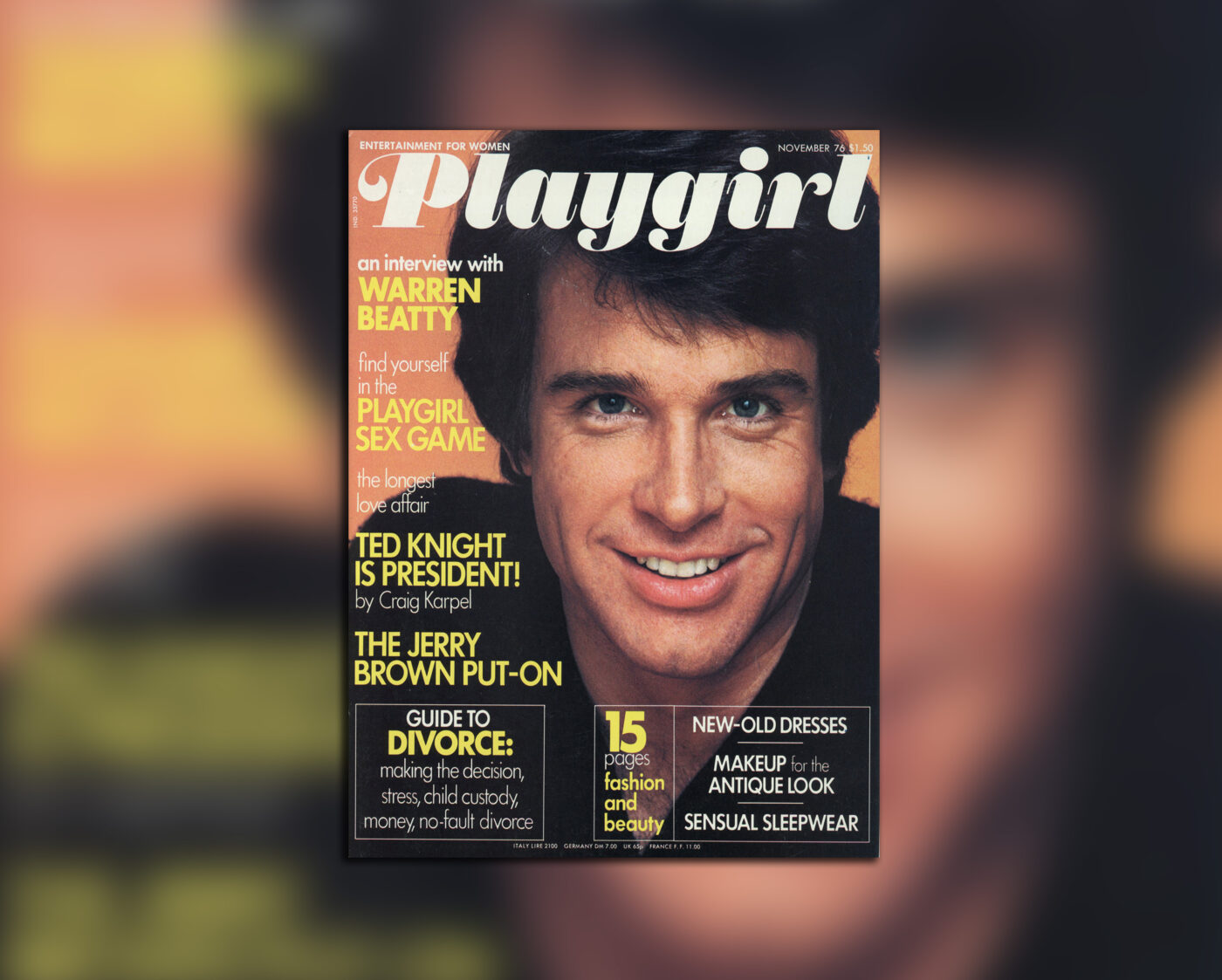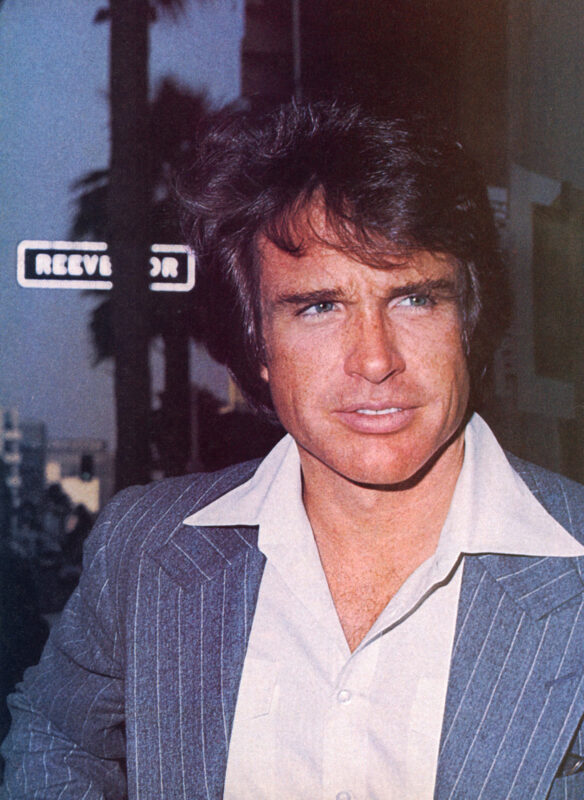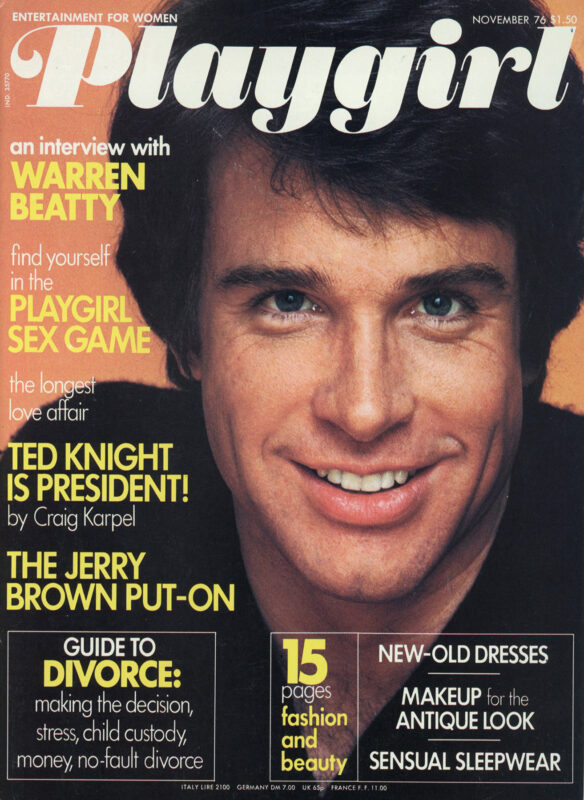For a man who closely guards his personal life, Warren Beatty’s name constantly appears in the media. A magazine prints a story about his growing interest in portraying the father of a porno movie actress in a film called Hard Core. A radio announcer discusses Beatty’s concern, along with his friend Jack Nicholson’s, regarding the trial and conviction of Harry Reems, the male star of Deep Throat. Newsweek ended its article on the death of Howard Hughes with the information that Beatty is interested in making a picture of the eccentric billionaire’s life. A gossip columnist in The Los Angeles Times reported that Beatty was participating in a charity auction by offering to shampoo the hair of the highest bidder. People magazine quotes his sister Shirley Maclaine as saying she’d like to do a love scene with Warren to find out what makes him so irresistible to women.
Shirley isn’t the only one who would like to know. There is a scene in Shampoo where Beatty is making love to Julie Christie on the floor of a recreation room, being secretly watched by Christie’s film lover, Lester, who doesn’t know it’s HER under HIM. “God,” Lester says in admiration at the intensity of the love making, “that’s what I call fucking.”
A woman friend of Beatty says that scene is accurate. “He’s the best,” she says. “He’s considerate, he’s interested in people, he draws out my fantasies. He likes to know my wildest thoughts.”
The woman continues, telling of the time he called her at a rather inopportune moment. “You’re making love,” Beatty said to her over the phone. “Don’t let me disturb you.” But disturb he did. No sooner did she hang up, whispering, “That was Warren,” than the man who was doing so well before the call lost it. “There went the evening,” the woman recalls. “I guess men have a problem competing with Warren’s image.”
Beatty’s reputed passion for women makes Bobby Fischer’s obsession for moving knights and bishops across a checkered board seem casual. Of course, reputations tend to be overblown, but Beatty’s public romances alone read like a Who’s Who of Available Beautiful Women: ranging from Natalie Wood to Maya Plisetskaya, Joan Collins, Leslie Caron, Liv Ullmann, Julie Christie and Michelle Phillips. Rich, famous, handsome, political, always in pursuit of happiness and pleasure, Beatty is more than a little notorious as a free-swinging Los Angeles prowler, picking up women in restaurants, parking lots, hallways, on the road, at parties.
Born in Richmond, Virginia, March 30, 1937, Beatty turned down ten college football scholarships to pursue an acting career. He studied with Stella Adler in New York and appeared on Broadway in William Inge’s A Loss of Roses. Shortly thereafter, in 1961, he got his first movie break when Elia Kazan cast him to star opposite Natalie Wood in Splendor in the Grass.
Since then, he has averaged one movie a year, playing opposite such actresses as Elizabeth Taylor, Faye Dunaway, Julie Christie, Vivien Leigh, Jean Seberg, Leslie Caron and Goldie Hawn in pictures like The Only Game in Town, Bonnie and Clyde. McCabe and Mrs. Miller, Shampoo, The Roman Spring of Mrs. Stone, Lilith, Promise Her Anything, Dollars, Mickey One and the Fortune.
Beatty’s own fortune was made with Bonnie and Clyde, which he produced after being told about it by Francois Truffaut (who heard about it from Jean Luc Godard). Following that film, he became obsessed with doing a film about a compulsive Don Juan. It took seven years to make, but Shampoo has been an even greater financial success than Bonnie and Clyde.
Although he’s considering roles in Hard Core and as Howard Hughes, Beatty’s most recent obsession is making a film about radical journalist John Reed, whose book Ten Days That Shook the World, is the classic treatment of the Russian Revolution.
Considering himself a “sometime actor,” Beatty’s interest in politics has been well known, especially to liberal politicians who are constantly courting him for support. A strong backer of Senator Edward Kennedy, Beatty only came out for Governor Jerry Brown’s presidential bid when he was finally convinced that Kennedy would not make a run against Jimmy Carter.
In 1972 Beatty helped raise $2 million for George McGovern. And many people wouldn’t be surprised if one day, when he’s a bit more settled in his ways, he tries running for office himself.
In the meantime, he’s content splitting his time between his penthouse apartment at the Beverly Wilshire Hotel and his house overlooking Los Angeles on Mulholland Drive.
Like Richard Nixon, Beatty doesn’t divulge much about his life in an interview. He speaks to reporters rarely, and refuses to discuss the women with whom he’s been romantically linked because he finds it an invasion of their privacy. As for what he thinks of all that’s been written about his sexual activities, he says, “If I tried to keep up with what was said about me sexually, I would be, as Sinatra once said, speaking to you from a jar in the University of Chicago Medical Center.”
Playgirl: Of all the places a movie star could find to live in Southern California, why do you choose to live in a hotel?
Beatty: It’s attractive to me for several reasons. For one thing, I can come and go whenever I like, and that’s important because I spend a lot of time elsewhere. For another thing, it’s energizing because it’s simple, and therefore easy to clean, and therefore easy to think clearly in. Do you understand? Probably not, because it’s so messy now, but in another week, it will be absolutely meticulous and that’s when I’ll start thinking again.
Isn’t a hotel a curious place to try to think?
Not really, I’ve done some of my best thinking here. The ideas for Bonnie and Clyde and Shampoo both took shape here. The only real distraction is the telephone, and I can always turn it off, if I want.
You turn off the telephone? You have a reputation for telephonitis.
That’s true, up to a point, but you must remember that there’s something very unrealistic about the telephone, something that eliminates a lot of comings and goings.
Of women? Of interviewers?
I’ll take the last question first, although in a way they both lead into the same answer. My only problem with interviewers — and I guess it’s everybody’s problem — is being quoted out of context. On the other hand, I’m well aware that if an interview is done well, it can make you sound much better than you are. What I really resent is the interviewer who wants you to do all the work. The interviewer who says, “What’s it like being Warren Beatty?” and then doesn’t have anything to follow up with.
What’s it like being Warren Beatty?
It’s like “I … I … I … I .. . I . . .” You see what I mean? I know you’re making a joke, but that sort of question forces you into a posture of narcissism that’s boring for everybody.
You said you would answer the other part of the question about comings and goings.
I will, and the reason it’s relevant is that most interviewers seem primarily concerned with my sex life. The news magazines are the worst offenders, because they don’t take actors seriously. Since we’re not important, they can be careless about their facts when they’re writing about us. Let’s face it, they know that the movies need their cooperation if the movie industry is going to sell its products. So, they write whatever they want.
Let me give you an example. One of the big news magazines did a story on me, which I agreed to because they said they would feature my new movie on the cover. And right in the middle of the story they wrote that I had fired a female photographer because I had tried and failed to seduce her. I can’t tell you how angry that made me. I don’t care how wildly people speculate about my sexual activities, because they’re going to anyway. It’s part of the business. If you’re in the public eye long enough, and particularly if you make a movie like Shampoo, then I suppose you’re asking for it. But to say that I would take someone’s job away because she wouldn’t go to bed with me really made me angry.
What, if anything, did you do about it?
I went to the editor of the magazine and asked him how they could be so irresponsible. And he apologized for it, but no retraction ever appeared. They just assumed that I would never spend the time and money to take them to court. They’re wrong. In my old age, I’m ready to go ahead and start suing when that kind of libel appears.
Do you think the libel is intentional?
No, sometimes it’s a case of simple misunderstanding. One reporter misinterpreted me when I told him that “polygamy is dumb fun.” In the first place, I didn’t mean to equate polygamy with promiscuous behavior. The Mormons wouldn’t like that, and anyway I don’t really think it’s fair to call it dumb fun. What I meant was that I feel there can be an element of fun in promiscuity. Which is not to say that I am advocating promiscuity. I’m not. What I was saying is that it takes intelligence and concentration, especially these days, to unify all of one’s sexual and emotional impulses to form an honest and sharing relationship with one person — the sort of relationship we call monogamy. Since the divorce rate has doubled or tripled in the last ten years, I don’t think it takes any genius to see that marriage has fallen upon bad times…
…Keep reading on PLAYGIRL+









